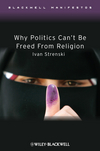
Why Politics Can't Be Freed From Religion
| List Price: | US $43.75 |
| Government Price: | US $24.92 |
Why Politics Can’t Be Freed From Religion
Religion. Power. Politics. Ideas and institutions that have been laden with a baggage of meanings picked up through the course of history – and which, unfairly or not, are often defined by these historic and social contexts. Ivan Strenski begins his book, Why Politics Can't Be Freed From Religion (March 2010, U.S.; February 2010, UK), in his Los Angeles living room in the summer of 2009, watching the demonstrators protest the recent election of President Ahmadinejad. As he watches the struggle between the powers that be (the police and militia), and the demonstrators, Strenski questions what he really “sees” as he looks at the events unfold.
Can these events, and acts such as human bombing or suicide bombing in the Middle East be distilled and simply described as “politics as usual”? Or are there other ideas at work, including religious and social motivations that have been repeated througout history in unimaginably complex ways? Do power, religion, and politics form a multi-layered reality in which we all function, whether we realize it or not?
A spokesperson for the Christian-right, the Reverend Pat Robertson, has claimed that “Islam is not a religion,” due to its overuse in a political context. Strenski likens the relationship between politics and religion to the hammer and the nail, each exchanging roles when it is appropriate or convenient to the agenda at hand.
Through a process of intense critical interrogation, Strenski digs beyond the simplistic claim that “everything is politics” and proceeds to unpack our assumptions about the interplay between politics, power, and religion. Eventually the reader truly sees the distinguishing features of each and can think with them, and apply these concepts to suicide bombing in the Middle East, the meaning behind Abraham’s sacrifice of his son, or the power behind the papal state.
Strenski pin points Six Common Clichés that often trip us up when entering this conversation:
The Religion-Is-Good Cliché: Based on the view that all religions are “religions of peace,” (as exemplified in the work of Dr. Martin Luther King, Jr., the Dalai Lama, and Gandhi) the flipside of this cliché is that political entities are violent or war-loving, and “hijack” religion (Ku Klux Klan, the IRA, the Crusaders) for their own ends. President Goerge Bush spoke in similar terms during a post-09/11 speech, “I want to speak tonight directly to Muslims … its teachings are good and peaceful.”
The Religion-Is-No-Good Cliché: An opinion perpetuated by “the new atheists” Richard Dawkins, Daniel Dennett, Sam Harris, and Christopher Hitchens, Strenski questions the opportunism inherent in Hitchens’ claim that “religion poisons everything,” and the apparent Islamophobia buried in his arguments. Plenty of religions such as Quakerism, Zen Buddhists, and the Amish live in a non-descructive, and peaceful manner. Strenski advises that we think of religion in a more relaxed way: our definition of religion needs to be accurate, but not necessarily precise.
Religion Is Belief and Belief in God: Strenski points out that the prerequisite of personal faith as a trait of a true religious person (chosen over ritual practice) is fairly recent and largely influenced by the Reformation period. The focus on “confession” or “testimony” is also a relatively modern idea. Tony Blair felt the need to eventually “shout it from the rooftops,” that he was a practicing Roman Catholic, rather than simply practicing his faith.
‘Religion’s’ Private Parts: The idea that faith is essentially private in nature, independent, and a direct reflection of the “innermost workings of the heart,” rather than linked to the events that take place in the “public square,” and in the world of politics.
Powerless in Paradise: The common assumption that historically power and politics have had, cannot, and should not, have anything to do with eachother, when realities such as suicide bombing in the Middle East reveals a very different reality.
Two Ways to Eliminate ‘Religion’: The formalists say that religion should only be used as an outdated, arbitrary “marking device” or concept, much like our old view of science (Isaac Newton), but ignore its contemporary relevance, particular in relation to power and politics.
Strenski’s treatment of religion, politics, and power in Why Politics Can't Be Freed From Religion (March 2010, U.S.; February 2010, UK), includes radical critiques of the religious and political perspectives of thinkers such as Talal Asad, Michel Foucault, David Émile Durkheim, and Louis Leakey.



